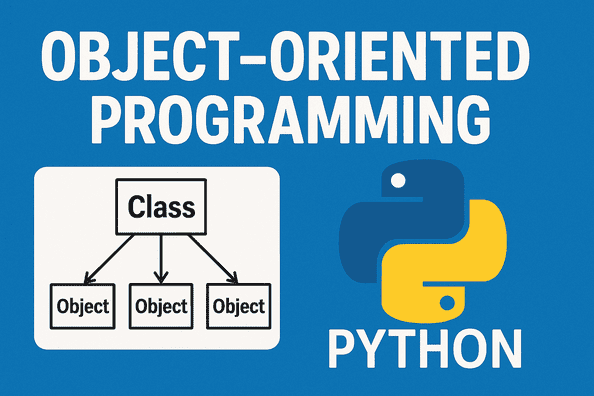Object-Oriented Programming in Python
By: Bindeshwar Singh Kushwaha
Institute: PostNetwork Academy
What is Object-Oriented Programming (OOP)?
- OOP is a programming paradigm.
- It is based on the concept of “objects”.
- Helps model real-world entities like
BankAccount,Student,Car. - Makes code more organized, reusable, and easier to maintain.
Class in OOP
- A class is a blueprint or template.
- It defines attributes (data) and methods (functions).
- Example:
BankAccount,Student,Car.
Object in OOP
- An object is an instance of a class.
- It has its own data and can use class methods.
- Think of a class as a blueprint, and the object as the house.
Class Declaration
class BankAccount:
"""Class to simulate bank account"""
Explanation: Defines a class to simulate a basic bank account.
Constructor Method
def __init__(self, password):
self.balance = 0
self.password = password.strip()
Explanation: Initializes the balance and stores the password securely.
Deposit Method
def deposit(self, amount):
self.balance += amount
return self.balance
Explanation: Adds amount to the balance and returns updated balance.
Withdraw Method
def withdraw(self, amount):
user_password = input("Enter password to withdraw: ").strip()
if user_password != self.password:
return "Incorrect password. Withdrawal denied."
if amount > self.balance:
return "Insufficient Balance"
self.balance = self.balance - amount
return self.balance
Explanation: Allows withdrawal after verifying password and checking balance.
Account Creation
ac101 = BankAccount(password="1234")
Explanation: Creates an account object with the password “1234”.
Main Menu Loop
while True:
print("\n==== Bank Menu ====")
print("1. Deposit")
print("2. Withdraw")
print("3. Check Balance")
print("4. Exit")
choice = input("Enter your choice (1-4): ").strip()
Explanation: Displays a menu and runs until the user chooses to exit.
Deposit Option
if choice == "1":
amount = float(input("Enter amount to deposit: "))
ac101.deposit(amount)
print("Amount deposited. Current balance:", ac101.balance)
Explanation: Takes deposit amount and updates the account balance.
Withdraw Option
elif choice == "2":
amount = float(input("Enter amount to withdraw: "))
result = ac101.withdraw(amount)
print("Withdrawal result:", result)
print("Balance after withdrawal:", ac101.balance)
Explanation: Takes withdrawal amount, verifies password, and processes the transaction.
Check Balance / Exit
elif choice == "3":
print("Current balance:", ac101.balance)
elif choice == "4":
print("Thank you for banking with us.")
break
else:
print("Invalid choice. Please select from 1 to 4.")
Explanation: Option 3 displays balance, option 4 exits, other inputs show error.
Video
PDF
oopsbank
🔗 Reach PostNetwork Academy
- Website: www.postnetwork.co
- YouTube: PostNetwork Academy
- Facebook: facebook.com/postnetworkacademy
- LinkedIn: linkedin.com/company/postnetworkacademy
